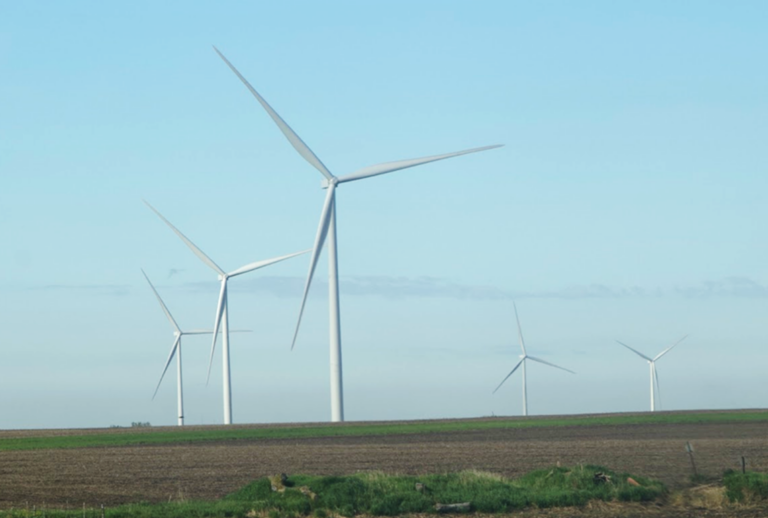Illinois saying no to coal and natural gas, hello to wind and solar (and maybe nukes)

By: Ted Dabrowski and John Klingner of WIREPOINTS
The Illinois Senate adjourned this week without calling for a vote on the state’s controversial green energy proposal, delaying a massive transformation of the state’s energy sector. The energy package includes a requirement for the state to go fully green by 2050, sets shut-down dates for coal and natural gas plants, gives hundreds of millions in subsidies to Exelon’s nuclear plants, adds new funding for energy construction and infrastructure projects, and more.
The delay is good news for the general public and watchdog groups, which have no idea what’s really inside the non-transparent, 800-page-plus draft bill that has yet to be filed. Its financial impact isn’t fully known, though no doubt each special interest group knows exactly what’s in it for them.
The best way forward would be for lawmakers to take a break from negotiations and listen to voices other than those of Illinois’ special interest groups – in particular those who will bear the burden of any deal: residents and businesses.
After all, it’s unlikely anybody knows the true cost of the green subsidies in the bill. Or the true costs for Exelon to properly maintain Illinois’ nuclear power facilities. Or how the state will be able to move from its current 8 percent in clean-energy generation to 40 percent in just nine years. Or to 100 percent clean energy in 29 years. Will Illinois be forced to buy energy from nearby states at exorbitant costs because it can’t produce enough in the future? Will the state experience power outages? What’s the true, net impact on jobs from all the changes?
Not to be ignored are the bill’s optics, especially when it comes to ethics. The last major energy deal in 2016 that subsidized Exelon’s nuclear plants has since been tainted by admissions of corruption and graft.
Champions of a deal, including Gov. J.B. Pritzker, are stuck balancing the competing demands of the labor unions, environmentalists, the equity movement and big business – all while cramming an enormous change down on Illinois’ energy sector and the general public.
Those competing interests are the reason why the package stalled. Environmentalists want rapid shutdowns of the state’s coal and natural gas plants. Labor unions want those plants kept open for as long as possible to preserve thousands of union jobs. That impasse has yet to be solved.
And there are yet more issues at stake.
Exelon wants subsidies to keep its Illinois nuclear plants running. Climate activists want subsidies of their own for renewable energy sources, electric cars, and more. Not to mention the struggle over who controls the money that will flow to new programs, commissions, task forces and infrastructure projects.
Perhaps what best defines what this bill is, and what it is not, are the comments by State Rep. Ann Williams: “We need to pass a climate bill, not a utility bill…Without climate, and without equity, we have no deal.”
“Energy” package delay unsurprising
The senate’s failure to pass the energy package after months of negotiations isn’t that surprising.
For one, the plan faces lots of scrutiny for the previous ties between former-House Speaker Mike Madigan’s staff and ComEd – nobody wants to be perceived as going too far to help a massive, profitable company that already benefited from previous graft (ComEd agreed to pay $200 million in fines to resolve an investigation into its bribery schemes). This new deal calls for Exelon, ComEd’s parent, to get nearly $700 million in ratepayer support for three of its nuke plants (two of which they’re threatening to shut down this year if no help is given).
Second, the package is a highly political and lucrative deal within the left, with interest groups fighting over the details. Gov. J.B. Pritzker summed up the competition saying: “This is not two interested parties – unions and environmentalists – this was not that. This was an eight-sided negotiation [and] very difficult to bring people together.”
The below list of items were compiled from a memo released by the governor detailing his version of the energy proposal.
- The green lobby is supportive of the bill because it phases out coal by 2035 and natural gas by 2045. It calls for 40% renewables by 2030 and 100% by 2050. (Never mind that renewables make up less than 10 percent of all production today and there’s no clear plan on how to make the transition to 100 percent clean. Compounding the problem, much of Illinois’ nuclear capacity – more than 50 percent of the state’s energy production – will decline over the next few decades.)
- The green lobby is also pushing for the bill because it specifically calls for the gradual phasing out of two major coal plants, Prairie State in Marissa and CWLP in Springfield, by 2035.
- Labor groups, in contrast, want coal power to remain online through 2045 to protect jobs. The governor’s compromise with them allows that, as long as carbon-capture technology can meet the demand for lower emissions.
- Labor groups want the bill because it requires for much of the conversion to green to be paid for with prevailing wages (union wages) for new infrastructure projects.
- Exelon supports the deal because it calls for $694 million in higher subsidies to keep three of the company’s Illinois nuclear plants afloat. The previous energy deal in 2016 under Madigan bailed out two other Exelon nuke facilities.
- Labor groups also want Illinois’ nuclear plants bailed out because it will mean thousands of jobssaved.
- Equity advocates approve the bill due to significant equity-focused provisions regarding energy jobs and investments.
- Green energy providers and manufacturers support the bill because they get subsidies from ratepayers totaling $215 million.
- The auto industry supports the bill because it includes an up-to-$4,000 subsidy for electric vehicle purchases.
- Big-government supporters back this bill because it provides for a future collection of new programs, commissions, task forces and spending.
The biggest group left out of the deal-making? Ordinary Illinoisans. They’re the ones on the hook for the inevitable rate hikes and future tax increases to pay for all the giveaways – and the potential risks inherent in fully transforming Illinois energy to renewables.
The energy bill deserved to be delayed for reasons beyond the politics involved. The lack of transparency, for one. Even among the bill’s supporters, it’s likely few know the math behind it or have even taken time to read what they’re going to pass. Considering how Illinois lawmakers tend to pass 1,000-page budgets at the last minute every year, that’s a pretty safe bet.
Passage of the bill in some form is inevitable. With supermajorities in place, Illinois Democrats will likely end up hashing things out. This is Illinois, so expect special interests to win and ordinary Illinoisans to lose out.
A better plan would be to actually engage with those most impacted by any energy changes – residents and businesses. A coalition of business organizations recently asked for just that: “On behalf of the people most impacted by this legislation, we urge you to delay this legislation and meaningfully engage the consumers, business owners, organizations and municipalities that will be saddled with the costs.”
Miss Clipping Out Stories to Save for Later?
Click the Purchase Story button below to order a print of this story. We will print it for you on matte photo paper to keep forever.

